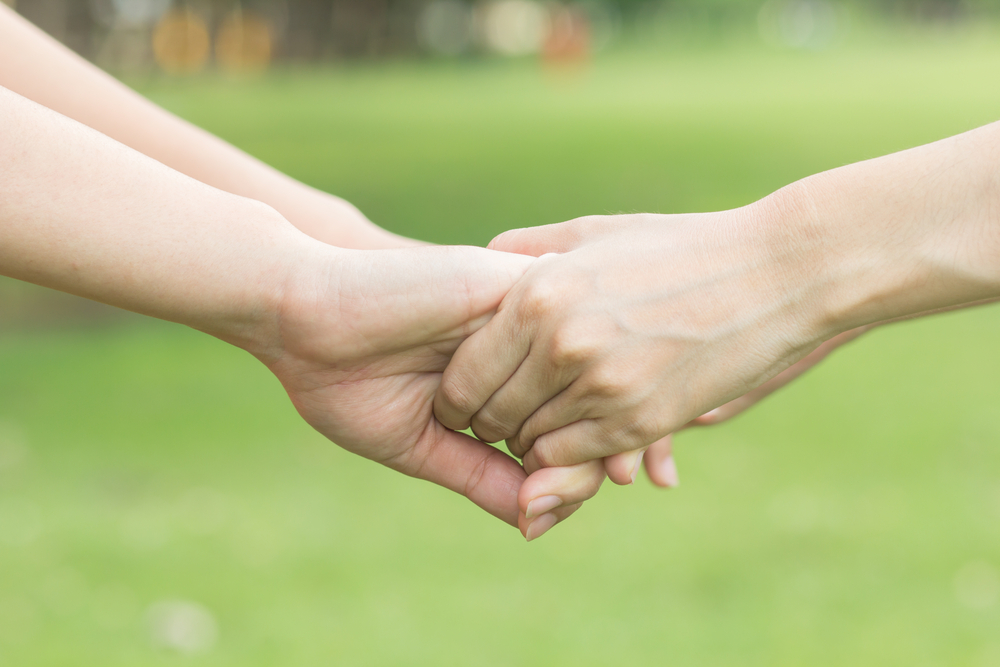Help Me Help You: A Carer’s Perspective

Last week, just after our wedding, Jared got a shoulder bleed.
Jared has severe hemophilia B, but he does not get bleeds often. When he does, it’s almost like a vacation from things, a sign that we need to take things more slowly. When the bleed clots, it’s back to reality again.
One thing I’ve learned over the years is that tending to a bleed requires certain lifestyle adjustments. He can’t do strenuous physical tasks while the bleed is healing, so someone has to do them for him. Most often, that someone is me since I am his partner and the person in closest proximity.
The adjustments are often subtle and may vary depending on the location of the bleed. For instance, if he gets an ankle bleed, he can’t do too much walking for a day or two, so he usually just stays home to rest the injury while I run errands. If he gets a much-dreaded iliopsoas bleed, he has no choice but to remain in bed. (The iliopsoas is a huge muscle group, and a bleed in this location, in his view, is one of the most painful injuries one can have.) But in the case of a shoulder bleed, he can walk around and we can go places, but we can’t ride public transportation — which, by the way, means having to push your way through throngs of harried commuters and climb into crowded jeepney cabins. So, we use ride-sharing instead. Ride-sharing is a blessing for people with disabilities who aren’t fortunate enough to have cars.
Sometimes the adjustments are in the tiny, everyday things: having to soap the parts of his back that he can’t reach due to his range of motion being limited by the bleed, reaching for things around the room, or consciously trying not to lean on his injured shoulder when we snuggle. We’re a pretty clingy couple, as we put it, so we tend to enjoy doing everything together, and cuddling whenever we can. But when injuries strike, compromises must be made.
It’s not that difficult, because Jared and I share a philosophy that all relationships require compromise. Our relationship is not special in this regard. We’re just two people contributing what each of us can to grow and strengthen the connection we share.
As a carer to a person with hemophilia, it’s inevitable that certain difficult responsibilities may fall upon me, especially when my husband is temporarily debilitated in the presence of injury. I don’t regard myself as a hero for fulfilling any of these responsibilities. They’re just things I have to do because I love my husband for exactly who he is — bleeding disorder, epilepsy, and all.
I admit, sometimes I do get tired and want a rest. Jared and I love each other deeply and share a very special connection, but both of us know we are far from the perfect couple. Sometimes we have misunderstandings. Sometimes we argue and fight. Sometimes, after a typical couple’s row, I find myself so emotionally drained — well, we both do — that I just want to withdraw into myself and not do anything for the entire day. But this doesn’t last for long. Before the day ends, we make up, and we’re ready to go about with life just as we did before.
What keeps me going is knowing I’m not alone, that I’m not the only one putting in an effort to make our relationship work. Jared has his own contributions, even when his physical condition constrains him. It’s usually the small things that matter most: asking me nicely when he needs something, patiently explaining why he can’t do something (yet), thoughtfully telling me he’ll make up for what he believes he’s missed out on. If it were up to me, he really doesn’t have to do any of those things anyway. He doesn’t need to apologize for having a condition. But it’s the thought and expression of care that goes a long way.
It gives me peace of mind knowing that he’s helping me help him by telling me what he needs and continuing to give me what I need emotionally: care, concern, tenderness, and affection.
It’s true that when someone is in pain, they can’t always demonstrate kindness and compassion. That’s just human nature. I understand. But carers are human, too. We get hurt, and we tire of having to extend our patience and understanding to seemingly infinite amounts. The smallest bit of empathy from our partner means so much to us. After a long day of hearing out expressions of discomfort or pain, a short but sweet hug is enough to make us feel better again. Tender words can feel like a battery recharge that allows us to perform the routine all over again when a new day begins.
***
Note: Hemophilia News Today is strictly a news and information website about the disease. It does not provide medical advice, diagnosis, or treatment. This content is not intended to be a substitute for professional medical advice, diagnosis, or treatment. Always seek the advice of your physician or another qualified health provider with any questions you may have regarding a medical condition. Never disregard professional medical advice or delay in seeking it because of something you have read on this website. The opinions expressed in this column are not those of Hemophilia News Today or its parent company, Bionews Services, and are intended to spark discussion about issues pertaining to hemophilia.







Leave a comment
Fill in the required fields to post. Your email address will not be published.